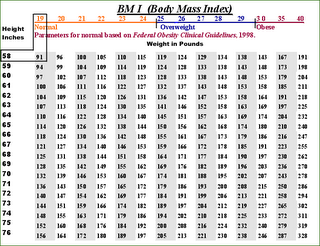
There are a few different ways to determine if you are overweight. Underwater weighing, computerized topography and measurement of skin folds with calipers can be the most accurate ways to measure fat. They can also be expensive and need to be done by professionals. Other options include the body mass index and waist measurement.
One of the more popular tools available is the body mass index (BMI). The body mass index was developed as a simple guide to assess your weight. This tool is an inexpensive, easy way to compare your body weight to the general population. It does have its limitations though. It does not take into account certain people, such as athletes, that have a higher than average amount of muscle. Muscle does weigh more than fat so these people may be considered overweight according to the BMI chart. Whether this puts them at a higher risk for disease is still unclear. Anyone who is overweight is at a higher risk of developing problems such as osteoarthritis. Our bodies are designed only to carry so much weight. Conversely, the BMI chart may put a person with too little muscle mass in the healthy range. This can include elderly and malnourished people. So, it is important to look at this as only one tool to determine if you need to lose weight or not. For most people it will be obvious, but others may have to check with a healthcare professional before starting a weight loss program.


No comments:
Post a Comment